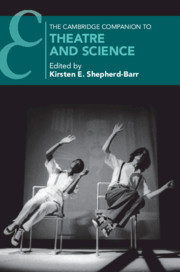Book contents
- The Cambridge Companion to Theatre and Science
- Cambridge Companions to Theatre and Performance
- The Cambridge Companion to Theatre and Science
- Copyright page
- Contents
- Illustrations
- Contributors
- Acknowledgements
- Introduction
- 1 Objectivity and Observation
- 2 Staging Consciousness
- 3 The Experimental/Experiential Stage
- 4 A Cave, a Skull, and a Little Piece of Grit
- 5 The Play at the End of the World
- 6 Bodies of Knowledge
- 7 Pathogenic Performativity
- 8 Theatres of Mental Health
- 9 Devised Theatre and the Performance of Science
- 10 Theatre and Science as Social Intervention
- 11 Acting and Science
- 12 Staging Cognition
- 13 Clouds and Meteors
- 14 ‘The Stage Hand’s Lament’
- Index
- References
1 - Objectivity and Observation
Published online by Cambridge University Press: 20 January 2021
- The Cambridge Companion to Theatre and Science
- Cambridge Companions to Theatre and Performance
- The Cambridge Companion to Theatre and Science
- Copyright page
- Contents
- Illustrations
- Contributors
- Acknowledgements
- Introduction
- 1 Objectivity and Observation
- 2 Staging Consciousness
- 3 The Experimental/Experiential Stage
- 4 A Cave, a Skull, and a Little Piece of Grit
- 5 The Play at the End of the World
- 6 Bodies of Knowledge
- 7 Pathogenic Performativity
- 8 Theatres of Mental Health
- 9 Devised Theatre and the Performance of Science
- 10 Theatre and Science as Social Intervention
- 11 Acting and Science
- 12 Staging Cognition
- 13 Clouds and Meteors
- 14 ‘The Stage Hand’s Lament’
- Index
- References
Summary
Chapter 1: This chapter starts by tracing the development of objectivity in both science and theatre through classical and early modern theatre, in which it was a fairly unimportant epistemic virtue, into the late eighteenth century where objectivity begins to emerge through the idealizations of ‘Truth-to-Nature’ in biology and in literary and theatrical Romanticism. Although some conceptions of scientific objectivity and observation treat these as virtuous by the extent to which they rise above personal or historical bias, the practice and theory of both objectivity and observation have changed through history. Drawing on the work of Lorraine Daston and others, the chapter goes on to show that the emergence of modern (‘mechanical’) objectivity, and a new relationship with observation, mark both nineteenth-century science and Naturalist theatre. Making the comparison explains some of the antitheatrical claims of Naturalist authors and the contradictions of Naturalist practice. As nineteenth-century ‘objectivity’ is superseded, so the theatrical figuration of science gravitates towards areas of ambiguity, chaos, and indeterminacy.
Keywords
- Type
- Chapter
- Information
- The Cambridge Companion to Theatre and Science , pp. 12 - 25Publisher: Cambridge University PressPrint publication year: 2020



